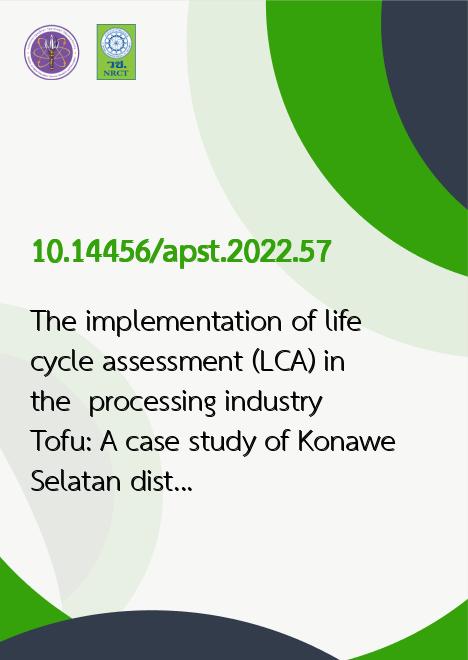
|
The implementation of life cycle assessment (LCA) in the processing industry Tofu: A case study of Konawe Selatan district, Indonesia |
|---|---|
| รหัสดีโอไอ | |
| Creator | Dhian Herdhiansyah |
| Title | The implementation of life cycle assessment (LCA) in the processing industry Tofu: A case study of Konawe Selatan district, Indonesia |
| Contributor | Septiana A. Sari, Sakir S, Asriani A |
| Publisher | Asia-Pacific Journal of Science and Technology |
| Publication Year | 2565 |
| Journal Title | Asia-Pacific Journal of Science and Technology |
| Journal Vol. | 27 |
| Journal No. | 4 |
| Page no. | 11 |
| Keyword | Tofu, Tofu industry, Environmental impact, LCA |
| URL Website | https://www.tci-thaijo.org/index.php/APST |
| Website title | https://so01.tci-thaijo.org/index.php/APST/article/view/258171 |
| ISSN | 2539-6293 |
| Abstract | This study aims to determine the impact on the environment caused by the production of tofu using the Life Cycle Assessment (LCA) method in the tofu processing industry in the South Konawe Regency, Indonesia. The research location was determined purposively. The research subjects were the parties involved in the research, namely processing industry voters, while the object in this study was tofu processing using the Life Cycle Assessment (LCA) method. Data collection was carried out by interview and documentation methods. The results showed that the total greenhouse gases (GHG) emissions from the life cycle of 1 kg of tofu products were 1.4343 kg CO2-eq. The emission value is due to the input inventory at the transportation stage, the extraction of soybean raw materials, which is the main cause for tofu products producing high emissions compared to other inventory results. The scenario for improvement at the transportation stage is to substitute fuel oil (BBM) with gas fuel (BBG) for truck, pick-up, and motorbike transportation. Improvement scenarios at the tofu processing stage, including the utilization of tofu liquid waste biogas, replacing the furnace with a boiler, and reducing electricity consumption for washing soybeans. Through the application of these alternatives will have the potential to reduce greenhouse gases (GHG). |